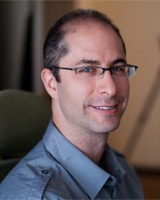Mark Goldszmidt

Current Appointments
Scientist, CERI
Professor, Division of General Internal Medicine, Department of Medicine
Associate Scientist, Lawson Health Research Institute
E-mail: mark.goldszmidt@schulich.uwo.ca
Educational Background
MDCM, McGill UniversityInternal Medicine Residency, Queen's University
Internal Medicine Fellowship, University of Western Ontario
Masters of Health Professions Education, University of Illinois at Chicago
PhD, Maastricht University
Research Program Highlights
- How do teaching teams’ habitual patterns of communication impact the quality of care they provide?
- How does the framing of patient medical problems impact the care they receive?
- What do physicians reason about when seeing patients?
Publications from Google Scholar
Personal Biography
Just like symphony and jazz are different genres of music, there are also genres of medical communication which are different in theme, voice, and form. Mark studies the multiple genres that medical students, residents, and doctors use to communicate. Medical teaching teams flow between genres, such as a resident presenting a case to their supervising physician or a consulting doctor making a note in the chart. Mark is interested in how these communications shape the learning which student-doctors experience and the quality of care which patients receive. For Mark, the medical genres that doctors use to talk about patients frame the way that doctors are taught to think. Take, for instance, the commonly used ‘history of present illness’: if a medical student is taught to focus only on a patient’s acute or immediate illness during their discussion of the case, then the patient’s active but chronic conditions lie unused in the clinical mind. Consequently, mistakes may be made. Mark’s research seeks to explore such consequences of medical genres and to improve medical education through new understanding of these consequences. Mark studies innovative concepts such as problem-oriented case presentations and shared note taking. As a researcher, he hopes to theorize ways of teaching young doctors to use the genres available to them to develop greater awareness of their patients’ pathophysiological context, to reduce errors and gaps in care, and to build consensus around the goals of care with the patient.
“Professionalism is a promise of duty and expertise.” - Edmund D. Pellagrino
There are moments inside the medical system, Mark concedes, where he cannot help but think, ‘this shouldn’t be this way’—when the paperwork itself becomes the priority or the discharge of a complex case becomes more important than treating the patient. But it is from these challenges that ethically responsible education research is born. Mark feels his duty in the field of medical education research is to be an agent of change by creating systems which better evaluate the way we teach, think, and act—to help students see how they themselves are reasoning, and how experts reason differently, so that they can improve.
Through his research and involvement in the creation of CERI (and its precursor GAMES), Mark is working with his colleagues toward a system of medical communication and teaching which encourages trainees to explore their potential as creative clinical thinkers and communicators.








